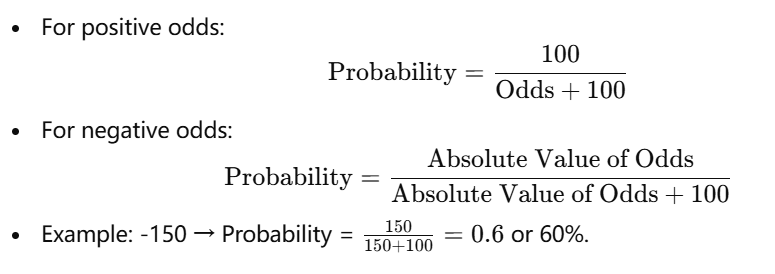How to read odds
Odds represent the likelihood of an event occurring and are commonly used in gambling, betting, and probability discussions. There are three main formats for odds: fractional odds, decimal odds, and moneyline odds. Here's how to interpret them:
1. Fractional Odds (e.g., 5/1, 3/2):
- How to read:
- The first number (numerator) is how much you can win relative to your stake.
- The second number (denominator) is your stake.
- Example:
- 5/1: For every $1 you bet, you win $5 (plus your original stake back, for a total of $6).
- 3/2: For every $2 you bet, you win $3.
- Calculation of implied probability:

2. Decimal Odds (e.g., 6.00, 2.50):
-
How to read:
- The number represents the total return (including your stake) for every $1 bet.
-
Example:
- 6.00: A $1 bet returns $6 (profit = $5).
- 2.50: A $1 bet returns $2.50 (profit = $1.50).
-
Calculation of implied probability:

3. Moneyline Odds (e.g., +200, -150):
- Positive odds (+): Represent how much profit you'd make on a $100 bet.
- Negative odds (-): Represent how much you need to bet to win $100.
- Examples:
- +200: A $100 bet returns $200 in profit (total payout = $300).
- -150: You need to bet $150 to win $100 (total payout = $250).
- Calculation of implied probability:

Comparison Table

| Odds Format | Example | Implied Probability | Profit on $10 Stake | Total Payout on $10 Stake | |--------------|---------------|---------------------|---------------------|---------------------------| | Fractional | 5/1 | 16.7% | $50 | $60 | | Decimal | 6.00 | 16.7% | $50 | $60 | | Moneyline | +500 | 16.7% | $50 | $60 |
If you're betting or analyzing probabilities, understanding these formats ensures you're making informed decisions. Let me know if you'd like more help with examples or calculations!
